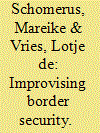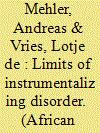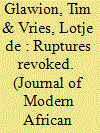| Srl | Item |
| 1 |
ID:
132339


|
|
|
|
|
| Publication |
2014.
|
| Summary/Abstract |
This article compares two cases of securitization along South Sudan's border with the Democratic Republic of the Congo. By comparing how a security concern - the presence of the Lord's Resistance Army - was interpreted and responded to, the article shows that border security practices in two borderscapes are improvised, contradictory and contested, and serve to establish authority rather than actually securing the border. This is apparent on three levels: (a) through the multiplicity of security actors vying for authority; (b) in how they interpret security concerns; and (c) in terms of what practice follows. The article argues that by allowing authority at the border to be taken by actors that are not under direct control of the central government, the South Sudanese state is developing as one that controls parts of the country in absentia, either by granting discretionary powers to low-level government authorities at the border or through tactical neglect. Processes of securitization by both state and non-state actors in the borderland are largely disconnected from the South Sudanese central government, which does not claim authority over this border and thus seemingly does not consider the lack of security for its citizens, and the parallel authorities, as a threat to central stability.
|
|
|
|
|
|
|
|
|
|
|
|
|
|
|
|
| 2 |
ID:
165975


|
|
|
|
|
| Summary/Abstract |
Assumptions about the political economy of African states predominantly centre on a dominant elite’s ability to stabilize power. A key assertion is that elites maintain clientelistic networks of rents and redistribution and in turn extend their control over their respective territories by instrumentalizing disorder. We challenge the assumption that disorder plays such a functional role. Largely drawing on data and fieldwork from the Central African Republic, we demonstrate the profoundly unproductive consequences of disorder that tend to be overlooked through current approaches to the political economy of African countries. We investigate how disorder impacts three dimensions of effective politics of domination: a set of elite groups that structure power in society, a political economy that redistributes its benefits through formal and informal networks, and the existence of functional centre–periphery ties across a territory. The article shows with regard to the Central African Republic that disorder has produced a small political elite that is largely unable to stabilize its power basis. We argue that certain African states are subject to forms of disorder that political elites cannot turn into an advantage.
|
|
|
|
|
|
|
|
|
|
|
|
|
|
|
|
| 3 |
ID:
160680


|
|
|
|
|
| Summary/Abstract |
The Central African Republic experienced unprecedented violence between 2012 and 2014. We analyse three recent ruptures that developed as a result of this crisis, suggesting a break with the country's past. First, the Séléka rebellion that started in 2012; second, the establishment of a robust UN Peacekeeping mission in 2014; and finally, the democratic election of a civilian president in 2016. However, three deep-rooted patterns of governance have in each case transformed these ruptures. A history of outsourced politics, a plurality of violence and peripheral neglect push actors to perpetuate the violent past rather than breaking with it. We conclude that after an initial attempt to break with the CAR's long-term political economic trends, rebel groups, the UN mission and the democratic government have backtracked and now risk reinforcing the violence that mark politics and everyday life in the country.
|
|
|
|
|
|
|
|
|
|
|
|
|
|
|
|